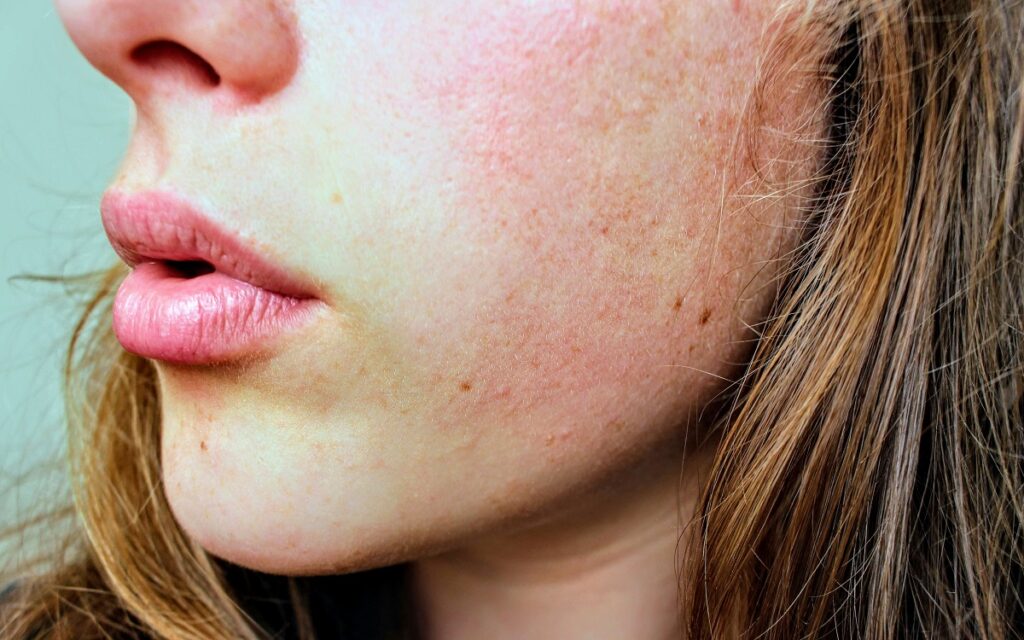When it comes to skincare, one size does not fit all. That’s because there are different skin types – dry, oily, combination, sensitive, and normal – and each requires a different approach. So if you’re tired of feeling like a stranger in your skin, it’s time to take control of your skincare routine and give your skin the love it deserves.
This comprehensive guide covers whether you have dry, oily, combination, sensitive, or normal skin. From cleansing and toning to exfoliating and moisturizing, we’ll show you how to care for your unique skin type and achieve a healthy, glowing complexion. So why wait? Let’s get started and discover the secret to beautiful, radiant skin!
How to Determine Which of the Five Different Skin Types You Have
Determining your skin type is essential in creating a skincare routine that works for you. By examining your pores, oil production, and sensitivity, you can better understand your unique skin type and how to care for it. We’ll take a closer look at each skin type and provide tips on determining your skin type and giving it the love it deserves.
Pores
- Normal skin: Pores are small and not visible.
- Dry skin: Pores are small and may be difficult to see.
- Oily skin: Pores are larger and more visible, especially on the nose, forehead, and chin (the T-zone).
- Combination skin: Pores may be larger and more visible in the T-zone but smaller and less visible on the cheeks.
- Sensitive skin: Pores may be small or medium in size but may appear more visible due to redness or irritation.
Oil Production
- Normal skin: Skin is neither oily nor dry and has a balanced oil production.
- Dry skin: Skin lacks natural oils and may feel tight or flaky.
- Oily skin: Skin has an excess of natural oils and may feel greasy or shiny, especially in the T-zone.
- Combination skin: Skin may be oily in the T-zone and dry on the cheeks.
- Sensitive skin: Skin may be either dry, oily, or in combination but may appear more oily due to irritation or redness.
Sensitivity
- Normal skin: Skin is not prone to irritation or sensitivity.
- Dry skin: Skin may be sensitive and easily irritated by harsh products or environmental factors.
- Oily skin: Skin may be less prone to sensitivity but may still be sensitive to specific ingredients or products.
- Combination skin: Skin may be sensitive in some areas and less sensitive in others.
- Sensitive skin: Skin is prone to irritation and sensitivity and may react quickly to products and environmental factors.
Different Skin Types: A Beginner’s Guide
Do you ever look at your skin and wonder what the heck is going on with it?
Why is it so dry?
Why do I have so many breakouts?
Why is it so oily?
If you’ve asked yourself these questions, you’re not alone. But have no fear because we’re here to help!
There are several skin types, each requiring a different skincare routine. So, let’s dive in and take a closer look at the various skin types and how to care for them.
Normal Skin
Congratulations, if you have normal skin, you’re one of the lucky few! Normal skin is balanced, clear, and not too dry or oily. It’s the Goldilocks of skin types – not too hot or cold, but just right.
To keep your normal skin looking its best, follow a simple skincare routine that includes cleansing, toning, and moisturizing. You can also use a weekly exfoliator to eliminate dead skin cells and keep your pores unclogged.
Dry Skin
You may feel like you’re constantly fighting flakiness and tightness if you have dry skin. This is because dry skin lacks natural oils and can handle rough to the touch.
To care for dry skin, it’s essential to keep it hydrated. Use a gentle cleanser and follow up with a moisturizer suitable for your skin type. Also, it would be best to avoid hot showers, as the hot water can strip your skin of its natural oils.

Oily Skin
You may feel like you’re constantly battling shine and breakouts if you have oily skin. Oily skin is caused by overactive sebaceous glands that produce too much oil.
To care for oily skin, use a gentle cleanser and toner to help control oil production. You were using an oil-free moisturizer to hydrate your skin without adding excess oil. Be sure to remove your makeup every night and exfoliate regularly to help keep your pores unclogged.
Combination Skin
If you have combination skin, you may have dry and oily skin areas. This can make it a bit tricky to find the proper skincare routine.
To care for combination skin, use different products on different areas of your face. For example, you might use an oil-free moisturizer on your oily T-zone (forehead, nose, and chin) and a richer moisturizer on your dry cheeks. Of course, it would be best if you also were sure to cleanse and exfoliate your skin regularly to keep your pores unclogged.
Sensitive Skin
If you have sensitive skin, skin care products and environmental factors may easily irritate you. Sensitive skin can be dry, oily, or in combination, often red and prone to breakouts.
To care for sensitive skin, it’s essential to use gentle products free from fragrances and other potentially irritating ingredients. It would be best if you also were mindful of the products you use on your skin, as certain ingredients (like alcohol and sulfates) can be harsh and irritating.
How to Care for Different Skin Types
Here are some tips on how to care for different skin types, so you can keep your skin healthy, radiant, and glowing.

Normal Skin
- Use a gentle cleanser to remove dirt, oil, and makeup without stripping your skin of its natural oils.
- Follow up with a toner to help balance your skin’s pH and tighten your pores.
- Moisturize your skin with a lightweight, non-greasy formula to keep it hydrated and healthy.
- Exfoliate your skin once or twice weekly to remove dead skin cells and unclog your pores.
Dry Skin
- Use a creamy, sulfate-free cleanser to gently remove dirt and makeup without drying out your skin.
- Follow up with a toner formulated for dry skin to help hydrate and soothe your skin.
- Moisturize your skin with a rich, nourishing formula to help lock in moisture and protect your skin from environmental damage.
- Avoid hot showers, as the hot water can strip your skin of its natural oils. Instead, opt for lukewarm water and a gentle shower gel.
Oily Skin
- Use a foaming, oil-free cleanser to help control excess oil and prevent breakouts.
- Follow up with a toner formulated for oily skin to help tighten your pores and control oil production.
- Moisturize your skin with a lightweight, oil-free formula to hydrate your skin without adding excess oil.
- Exfoliate your skin regularly to remove dead skin cells and unclog your pores.
Combination Skin
- Use a gentle, sulfate-free cleanser to remove dirt and makeup without drying out your skin.
- Follow up with a toner to help balance your skin’s pH and tighten your pores.
- Use a different moisturizer on different areas of your face. For example, you might use an oil-free moisturizer on your oily T-zone (forehead, nose, and chin) and a richer moisturizer on your dry cheeks.
- Exfoliate your skin regularly to remove dead skin cells and unclog your pores.
Sensitive Skin
- Use a gentle, fragrance-free cleanser to remove dirt and makeup without irritating your skin.
- Follow up with a toner formulated for sensitive skin to help soothe and calm your skin.
- Moisturize your skin with a gentle, fragrance-free formula to help hydrate and protect your skin.
- Avoid using products that contain alcohol, sulfates, and other potentially irritating ingredients.
The Role of Diet and Lifestyle in Maintaining Healthy Skin
Your skin reflects your overall health, and your diet and lifestyle play a significant role in maintaining healthy skin. Here are some tips on how you can improve your skin through diet and lifestyle changes:
Eat a healthy, balanced diet.
A healthy, balanced diet can help keep your skin looking its best. Here are some specific foods that may benefit your skin:
- Fruits and vegetables: These are packed with antioxidants and nutrients that can help protect your skin from environmental damage and keep it looking youthful. Some skin-friendly options include berries, tomatoes, avocados, and leafy greens.
- Lean proteins can help build collagen, which helps keep your skin firm and elastic. Good lean protein sources include chicken, fish, tofu, and legumes.
- Healthy fats: These can help keep your skin moisturized and glowing. Good sources of healthy fats include nuts, seeds, avocados, and olive oil.
- Water: Staying hydrated is essential for healthy skin, as it helps flush toxins out of your body and moisturize your skin. Aim to drink at least eight glasses of water a day.
Manage stress
Stress can take a toll on your skin, causing it to look dull, dry, or breakout-prone. To help manage stress and maintain healthy skin, try incorporating relaxation techniques such as meditation, yoga, or deep breathing into your daily routine.
Get enough sleep
Sleep is essential for maintaining healthy skin, as it gives your skin time to repair and regenerate. Aim to get seven to nine hours of sleep each night to help keep your skin looking its best.
Protect your skin from the sun
Exposure to the sun can cause damage to your skin, including sunburn, age spots, and even skin cancer. To help protect your skin from the sun, follow these tips:
- Wear protective clothing: When you’re out in the sun, wear a hat, sunglasses, and clothing that covers your skin.
- Use sunscreen: Apply a broad-spectrum sunscreen with an SPF of at least 30 to your skin before you go outside, and reapply it every two hours or after swimming or sweating.
- Avoid the sun during peak hours: Stay out of the sun between 10 a.m. and 4 p.m., when the sun’s rays are the strongest.
These tips can help maintain healthy, glowing skin through diet and lifestyle changes. Consider a healthcare professional before making significant changes to your diet or lifestyle.
The Verdict on Different Skin Types
No matter your skin type, taking good care of it is essential. A skincare routine tailored to your skin type can help keep your skin healthy and looking its best. So, don’t be afraid to experiment with different products and techniques until you find what works.


